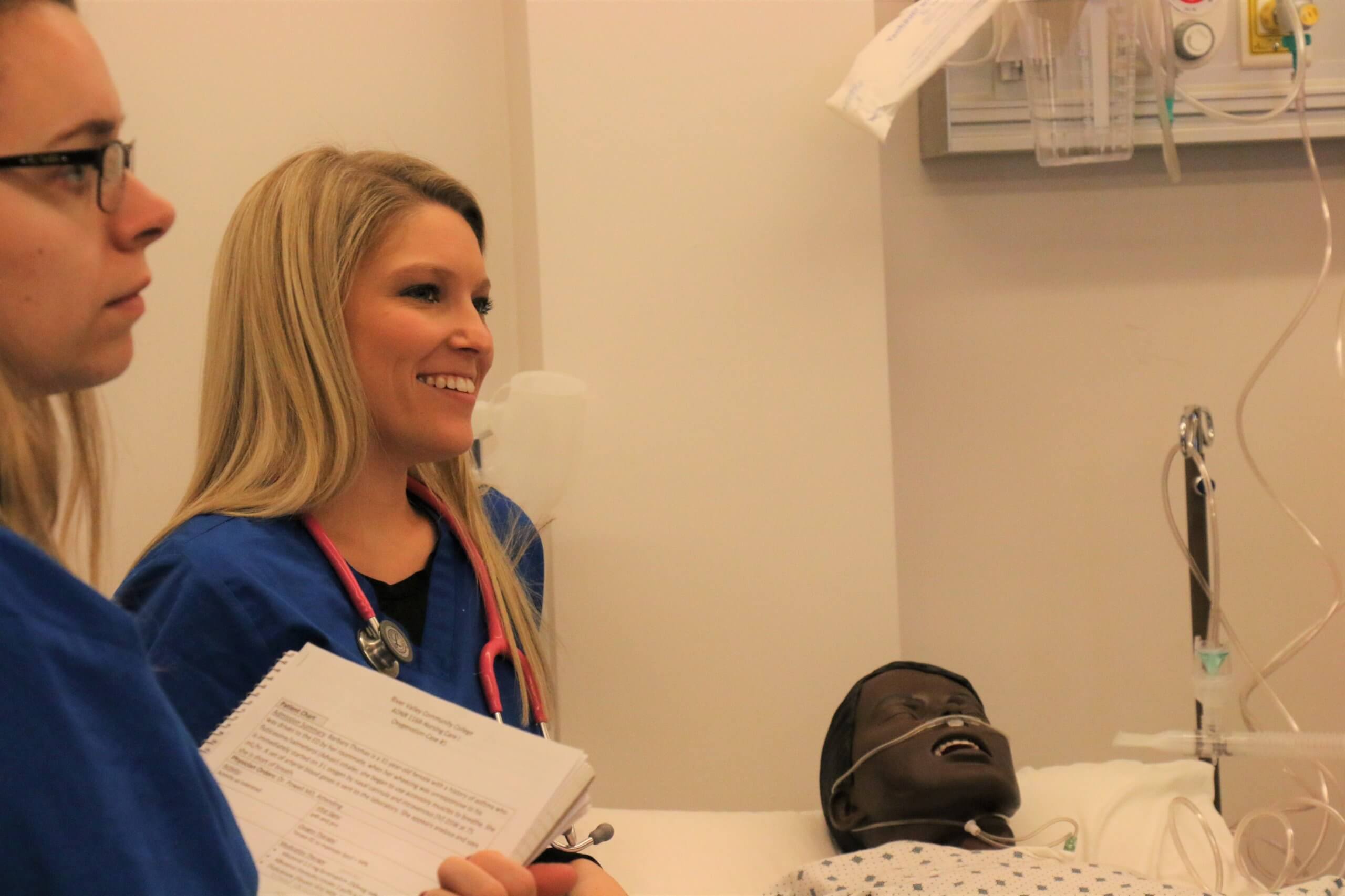Overview
The RVCC Licensed Practical Nursing Program is now available in Keene, Laconia, Lebanon, Littleton and Manchester, New Hampshire.
Becoming a Licensed Practical Nurse prepares you for a career in a fast-paced healthcare environment in just one year. Each LPN course incorporates classroom learning with simulation laboratory activities and are designed in every way to prepare you for a successful entry into the healthcare workforce. With a high demand in New Hampshire for LPN, starting your path to your career can start today!
With our LPN program closely linked with our rigorous associate degree nursing program, students who want to continue their healthcare career journey will be able to do so at River Valley.
Nursing Programs Student Handbook (PDF)
Career Options
Long term care, hospitals, physician/outpatient health centers, visiting nurse and home health care.
Interested students should review RVCC’s LPN Nursing Information Session presentation.
TEAS Testing
RVCC is pleased to offer prospective nursing students the Test of Essential Academic Skill (TEAS) remotely.
Register for the TEAS test at http://atitesting.com
RVCC 2024 TEAS DATES
Estimated cost: $120
· Remote TEAS testers will need to have free Proctorio proctoring software installed on testing computers prior to testing.
Related Degrees
- Nursing
- Respiratory Therapy
- Physical Therapy Assistant
- Medical Laboratory Technician
Admission Requirements
Submission of a completed application packet is the responsibility of each nursing candidate. Candidates will not be considered for admission until all admission requirements have been met.
Applications for January, 2025 are now being accepted; the deadline for applications is September 30, 2024 for Keene, Laconia, Lebanon, Littleton and Manchester.
Applicants will be notified by October 31st each year of their admissions decision.
Candidates must complete the college admission requirements and provide documentation of the following criteria for admission consideration:
1. Attend RVCC’s LPN nursing informational session.
2. Complete a college application
3. Submit all high school and college transcripts to the Admissions Department. Official transcripts may be sent directly to:
River Valley Community College
Admissions Department
1 College Place Claremont, NH 03743
Official transcripts may also be sent directly from high school or college electronically to: [email protected]
4. Register for and complete the Test of Essential Academic Skills (TEAS) of Assessment Technologies Institute (ATI)
Go to www.atitesting.com
Students must achieve minimum scoring in the following areas:
Reading – 69.0
Math – 63.3
Science – 43.8
English – 56.6
Current New Hampshire Licensed Nursing Assistant (LNA) licensure is required for entry; however, you may be eligible to have this requirement waived if you are currently working in Allied Health. Please contact [email protected] and you will receive an application and skills self-survey.
Additional Requirements
Upon acceptance into the Practical Nurse program, students must provide proof of the following:
- CPR Certification – American Heart Association Basic Life Support for Health Care Providers
- Criminal Background Check
- Drug Test
- Medical insurance
- Covid and Flu vaccines are mandated by the clinical sites and are therefore required prior to the start of all nursing programs at RVCC.
To be accepted health insurance must meet the following criteria:
- United States based insurance plan;
- Provides the 10 essential health benefits specified in the Affordable Care Act (https://www.healthcare.gov/glossary/essential-health-benefits/);
- Includes access to hospital and physician providers in the area where the student is attending a New Hampshire community college;
- Will remain in effect for the entire semester (except for termination due to the attainment of a maximum age, or other situation resulting in a loss of plan eligibility.
Course Sequencing
First Semester
Second Semester
Program Goals
- Eighty percent (80%) of students will graduate from the River Valley Community College Nursing Program within three years of the initial admission into the program.
- The first-time pass rate for River Valley Community College nursing graduates is equivalent to, or exceeds, the national pass rate for first-time test takers who are graduates of practical or associate degree nursing programs.
- Within six months of graduation from the River Valley Community College Nursing Program, ninety percent (90%) of the graduates will be employed as either Practical or Registered Professional Nurses.
End of Program Outcomes
| Performance on Licensure Examination | ||||||
| Expected Level of Achievement | ||||||
| NCLEX-PN pass rate – ELA . or = 80% for the first-time test takers annually. | ||||||
| Grad Year | Claremont | Keene | Lebanon | Laconia | Littleton | Manchester |
| 2020 | 100% | – | – | – | – | – |
| 2021 | – | 100% | 100% | 100% | – | – |
| 2022 | – | 86.7% | 91.7% | 81.25% | 100% | – |
| 2023 | – | – | – | – | – | – |
| 2024 | – | – | – | – | – | – |
| 2020 | National Average | 83.08% |
| NH Average | – | |
| RVCC Combined | 100% | |
| 2021 | National Average | 79.6% |
| NH Average | 97.8% | |
| RVCC Combined | 100% | |
| 2022 | National Average | 82.16% |
| NH Average | 77.60% | |
| RVCC Combined | 89.9% |
Practical Nursing Student Learning Outcomes
Graduates of the River Valley Practical Nursing curriculum will demonstrate competency
in:
Patient-Centered Care
Recognize the patient or designee as the source of control and a full partner in providing compassionate and coordinated care based on respect for the patient’s preferences, values, and
needs.
As evidenced by:
· Demonstrating
culturally competent, patient-centered care for patients and families across
the lifespan in a variety of clinical settings using nursing process as a
systematic approach for organizing, planning, implementing, and evaluating
care.
· Providing
equal and respectful care for patients and families from all socioeconomic
backgrounds and cultures.
· Using
interpersonal skills and professional values to create a therapeutic, caring
relationship with the patient and family.
· Demonstrating
collaboration and coordination with patients and families when making clinical
decisions regarding nursing care.
Evidence-Based Practice
Integrate best current evidence with clinical expertise and patient/family preferences and values for delivery of optimal health care.
As evidenced by:
· Participates in data collection and/or other research activities
· Collaborates with other professionals to provide individualized
care based on best current evidence, patient values, and clinical expertise
· Locates evidence reports related to clinical practice topics and
guidelines
· Participates in the integration of new evidence into standards of
practice, policies, and nursing practice guidelines
Safety
Minimize risk of harm to patients and providers through both system effectiveness and
individual performance.
As evidenced by:
· Participates in error analysis and systems improvement
· Contributes to the development of effective patient safety plans
· Uses appropriate strategies to reduce reliance on memory and
interruptions to reduce the risk of harm to self and others
· Demonstrates effective use of technology and standardized
practices that support safe practice
· Demonstrates effective use of strategies at the individual and
systems levels to reduce risk of harm to self and others
· Participates in collecting and aggregating safety data
· Uses organizational error reporting system for “near miss” and
adverse event reporting
· Communicates observations or concerns related to hazards and
errors involving patients and/or members of the health care team
· Prepares timely data collection to facilitate safe, effective
transfer of patient care responsibilities during care transitions
· Demonstrates the use of debriefing strategies to reduce
psychological and physical harm to patients
· Utilizes established safety resources to ensure safe and effective
practice
Teamwork and Collaboration
Function effectively within nursing and interprofessional teams, fostering open communication, mutual
respect, and shared decision making to achieve quality patient care.
Collaborate with the patient and family using effective communication to develop patient-centered,
goal-oriented, culturally appropriate plans of care.
As evidenced by:
· Demonstrates self-awareness of strengths and limitations as a team
member
· Initiates plan for self-development as a team member
· Acts with integrity, consistency, and respect for differing views
· Functions competently within the Licensed Practical Nurse scope of
practice as a member of the health care team
· Assumes the role of team member or leader based on the situation
· Initiates requests for assistance when the situation warrants it
· Acknowledges areas of overlap in role or responsibility as a
member of a team
· Uses the contributions of others when assisting patients to
achieve health goals
Informatics
Use information and technology to communicate, manage knowledge, mitigate error, and support decision-making.
As evidenced by:
· Accesses needed information accurately and efficiently
· Utilizes sources of data that reflect current standards of
practice
· Utilizes appropriate technologies in the process of assessing and
monitoring patients
· Uses information effectively to improve nursing practice
· Uses information technology to enhance own nursing knowledge
Quality Improvement
Collects data to monitor the outcomes of care and uses data to continuously improve the quality and safety of health care systems.
As evidenced by:
· Actively seeks information about quality initiatives in individual
care settings and organizations
· Participates in quality improvement processes to make processes of
care interdependent and explicit
· Participates in the use of quality indicators and core measures to
evaluate the effect of changes
· Participates in the use of quality improvement tools to assess
performance and identify gaps between local and best practices
The Nursing Program advances the mission of the River Valley Community College through excellence and accessibility to pre-licensure nursing programs of study. The Nursing Program supports students in achieving their personal and professional goals as responsible and contributing members of the nursing profession and of their communities. Our program is committed to providing innovative, evidenced-based curriculum that prepares students for evolving health care systems, commitment to outstanding patient care, and encourages lifelong learning. This program prepares students to take the national council licensing examination, and enter practice as either practical or registered nurses.
Effective February 8, 2021, this nursing program is a candidate for initial accreditation by the Accreditation Commission for Education in Nursing. This candidacy status expires on February 8, 2023.
Accreditation Commission for Education in Nursing (ACEN)
3390 Peachtree Rd NE Suite 1400
Atlanta, GA 30326
(404) 975-5000
http://www.acenursing.us/candidates/candidacy.asp
Note: Upon granting of initial accreditation by the ACEN Board of Commissioners, the effective date of initial accreditation is the date on which the nursing program was approved by the ACEN as a candidate program that concluded in the Board of
Commissioners granting initial accreditation

Kimberly Ambrose
Allied Health | LPNAssistant Professor, Practical Nursing
Dolores Gifford
Allied Health | LPNAssociate Professor & Program Director, Practical Nursing
Eileen Glover (she/her/they/them)
Allied Health | LPNProfessor & Department Chair, Allied Health


61-63 Credits Required
job placement rate for the past 3 years.
Program Contacts
Eileen Glover, Allied Health Department Chair and LPN Program Director
[email protected]
Dixie Vestal, Allied Health Program Assistant [email protected]
Dolores Gifford, Associate Professor & LPN Program Director
[email protected]
The clinical portion of the degree program is offered at area health care facilities (“clinical sites”). Clinical sites establish their own requirements for persons entering their facilities for educational purposes. Clinical sites may have established vaccination requirements, including vaccination for COVID-19. As with all clinical program requirements, the clinical site reserves the right to deny participation to any student who does not meet required clinical criteria and do not follow clinical site policies. Individual programs of study do not have the authority to secure clinical experience(s) for students who do not meet eligibility criteria. Students participating in clinicals must adhere to the sites’ requirements. While these are not college requirements, failure to adhere to the clinical site requirements will result in ineligibility to complete the Nursing program.



 Health Sciences and Services
Health Sciences and Services